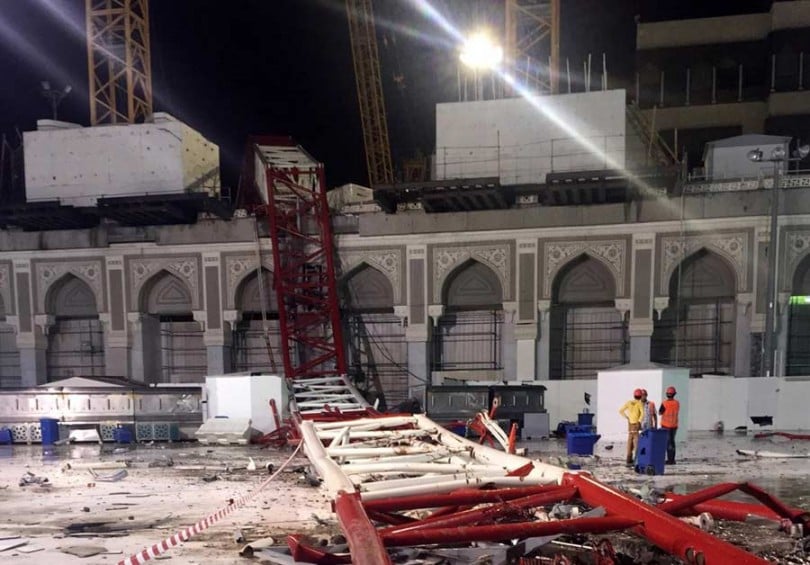The Media Line reports since the inception of the Saudi state, the construction firm founded by Mohammad Bin Laden has been the primary beneficiary of the ruling family’s investment in the pilgrimage city of Mecca and beyond.
Since the 1930s the fortunes of the Bin Laden clan have been tied to the House of Saud.
While the wayward Osama was sidelined by clan members three years prior to 9/11, the Saudi Binladin Group [SBG] continued to dominate the country’s construction landscape with multibillion dollar contracts for scores of projects including a one kilometer high skyscraper in Jeddah designed to be the world’s tallest building.
SBG’s $22.8 billion refurbishment of the Masjid al-Ḥarām complex in Mecca – a project which would allow over 105,000 worshippers to circulate the Kaaba per hour and accommodate a total of one million visitors in the Harām precinct, is the ultimate testimony to the family’s connection to the Saudi royals.
Last September’s crane toppling accident at the Sacred Mosque caused the Kingdom serious embarrassment. The Saudis were quick to blame the Bin Ladens for the deaths of 107 pilgrims in Mecca for the hajj.
“The emir of Mecca warned the chairman of the Saudi Binladin Group about the safety of his equipment 11 days before one of its cranes crashed into the Sacred Mosque,” claimed the official Saudi Press Agency just four days after the disaster which happened during a 25 mph sandstorm.
After finding that the company had failed to erect the crane according to the manufacturer’s specifications, King Salman announced a suspension of new contracts with SBG and prohibited its top executives from leaving the country.
Observers of the royal court in Riyadh say the new Saudi leadership exploited the Mecca disaster not only for image control, but to slow payments on mega projects as the price of oil plummeted.
Pointing to interviews given by deputy crown prince Mohammed Bin Salman to the local and international business media, observers say that the ruling family wanted the Bin Ladens to experience the same cash crunch as they did as oil fell to $47 a barrel in September 2015.
The 31-year-old Bin Salman also serves as the kingdom’s defense minister.
“We tried to compile all decrees over the last few years and we found that ministries could commit to more than US 1 trillion based on these decrees,” Prince Bin Salman told Bloomberg in March.
“So we froze them in 2015 and abolished three quarters of them that had no contractual commitment. The remaining quarter are things that have contractual agreements and things that we need to move forward,” said Bin Salman, adding that the spending slowdown helped the Kingdom avoid a catastrophe.
By December, SBG had deferred wage payments to many of its 200,000 employees and had reduced its workforce by almost a third.
The popular Jeddah daily Okaz estimates that company layoffs amounted to 69,000.
While half of the expatriate workers left the Kingdom after receiving their salaries, another thirty thousand desperately waited for their pay and sought new employers – a difficult process in Saudi Arabia where the iqama residency system ties worker visas to a single company.
Last week sacked expatriate workers staged rare public demonstrations claiming they were being kicked out the country before receiving their wages and set seven buses ablaze outside the company’s Mecca offices.
The violence may have paid off both for the fired workers and the company. The following day, the Labor Ministry’s Mecca branch reassured workers that their payment and residency issues would be handled.
“The workers of the Binladin Group enjoy good work experience and skills that qualify them to immediately join the labor market. This will save many companies recruiting costs should they wish to employ them,” said Abdullah Al-Olayan, the top Labor Ministry official in Mecca.
By the next day, the company had been granted permission to submit tenders for new government construction projects and had received the go ahead to proceed with the suspended Jeddah airport runways and terminal.
SBG is privately held, but estimates put its total worth at about $30 billion.
“The government is looking to develop its built environment to exceed the best of what’s around the world, and in this respect, the construction market cannot be run by one, two, three or even four companies,” said Fakher A. Al-Shawaf, General Manager of Al Bawani, the only publically-traded construction firm in Saudi Arabia.
“Today, authorities are highly focused on providing equal opportunities rather than a monopoly in the hands of a few.”
By | The Media Line




